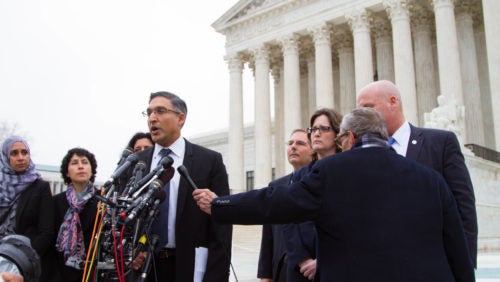Professor Neal Katyal Argues Travel Ban Case in Supreme Court
April 24, 2018

Georgetown Law Professor Neal Katyal faces the press on the steps of the Supreme Court after oral arguments in Trump v. Hawaii on April 25.
On April 25, the Supreme Court heard oral argument in the case of Trump v. Hawaii — with Georgetown Law Professor Neal Katyal, a partner at Hogan Lovells, arguing as counsel of record for the State of Hawaii.
Katyal’s brief asserts, among other things, that President Trump’s travel ban exceeds the president’s authority under the nation’s immigration laws as well as the Establishment Clause of the U.S. Constitution.
“The President’s order is without parallel in our Nation’s history,” the brief asserts. “For over a year, the President campaigned on the pledge, never retracted, that he would ban Muslims from entering the United States. And upon taking office, the President issued and reissued, and reissued again, a sweeping and unilateral order that purports to bar over 150 million aliens — the vast majority of them Muslim — from entering the United States. The immigration laws and the Constitution do not grant the Executive that unbridled power.”
But the government’s brief — with Solicitor General Noel J. Francisco as counsel of record — argues that “the exclusion of aliens is a fundamental act of sovereignty that rests on the ‘legislative power’ and ‘is inherent in the executive power to control the foreign affairs of the nation.’”
“The Constitution and Acts of Congress thus both confer on the President broad authority to suspend or restrict the entry of aliens outside the United States when he deems it in the Nation’s interest…,” the government’s brief states. “[T]he president determined that it was necessary to impose tailored entry restrictions on certain nationals of eight countries whose governments do not share adequate information with the United States or have other national-security risk factors, in order to induce those governments to improve their cooperation and to protect this Nation until they do.”
Katyal, who served as acting solicitor general during 2010-2011, said this week that, as always, the Georgetown Law faculty and Georgetown Law’s Supreme Court Institute have been essential in helping him think about the case. “From my first Supreme Court argument — [Hamdan v. Rumsfeld, regarding] Guantanamo in 2006 — to today’s, Georgetown Law has been essential. It truly is the place to study and learn about our Supreme Court.”